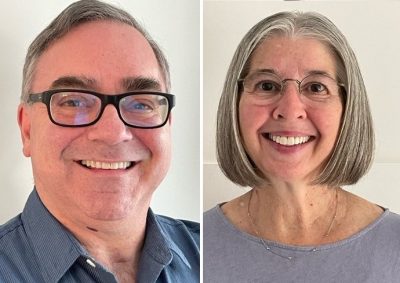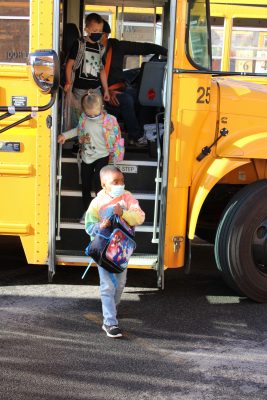Students from diverse backgrounds do better in school and are more likely to go to a four-year college if they have teachers from kindergarten through high school who look like them, numerous studies have shown.
Yet, teachers are often not representative of the student body. While U.S. public schools became majority-minority in 2014, nearly 80% of teachers remained white and female.
This dichotomy underscores what has become an urgent issue in education policy: the need to increase diversity in the teaching workforce.
A team from the School of Education and the Maxwell School of Citizenship and Public Affairs has partnered with local K-12 districts on an initiative designed to develop strategies for attracting more diverse college graduates to teaching careers. The four-year project has been made possible by the generosity of an alumni couple wishing to bring improvements to education with evidence-based approaches.
 Maxwell alumnus and advisory board member Ben Baldanza ’84 and his wife, School of Education alumna and board of visitors member Marcia Baldanza ’86, have pledged $300,000 to establish the Baldanza Fund for Excellence in Education Policy in Practice. “In creating this fund, we sought to bring together faculty experts to build evidence for data-driven strategies that will narrow achievement gaps among students, inform educational policies at all levels of government and, ultimately, improve educational outcomes,” they say.
Maxwell alumnus and advisory board member Ben Baldanza ’84 and his wife, School of Education alumna and board of visitors member Marcia Baldanza ’86, have pledged $300,000 to establish the Baldanza Fund for Excellence in Education Policy in Practice. “In creating this fund, we sought to bring together faculty experts to build evidence for data-driven strategies that will narrow achievement gaps among students, inform educational policies at all levels of government and, ultimately, improve educational outcomes,” they say.
Soon after making the pledge, the couple shared their vision with Christine Ashby, professor of inclusive special education and disability in the School of Education. “They conveyed their desire to do something that would have the potential to reduce inequities and really transform the way we think about education,” says Ashby.
She and faculty colleagues proposed recruiting 30 young alumni of color and training them for teaching jobs in the Syracuse area. These young professionals would learn together and seed a network of educators who share practices and support one another in building more inclusive schools. At the same time, researchers would test and analyze recruitment strategies and build evidence for what works.
“When we suggested it, they enthusiastically responded,” Ashby says.
The team, comprised of Ashby, George Theoharis, Leonard Lopoo and Robert Bifulco, began work immediately. Theoharis is professor of educational leadership and inclusive elementary/early childhood education. Lopoo is professor of public administration and international affairs, Paul Volcker Chair in Behavioral Economics and director of the Maxwell X Lab, while Bifulco is associate dean, chair and professor of public administration and international affairs at Maxwell.
By the end of September, they had lined up two partners, the Jamesville-DeWitt and West Genesee school districts, and anticipated at least one more would sign on soon.
 At Jamesville-DeWitt, 25% of students are non-white, far more diverse than the faculty. The district has recognized this discrepancy in representation in its 2020-25 strategic plan and committed funding to improving the balance, says Superintendent Peter Smith.
At Jamesville-DeWitt, 25% of students are non-white, far more diverse than the faculty. The district has recognized this discrepancy in representation in its 2020-25 strategic plan and committed funding to improving the balance, says Superintendent Peter Smith.
“The research shows students who have teachers of color and see other staff who look like them are more likely to graduate, to be successful, to be prepared for life after school,” Smith says.
The School of Education is working with districts on program development, while Maxwell’s X Lab is focused on a marketing campaign within Syracuse University and beyond to target recent bachelor’s degree graduates who may not have considered teaching.
The X Lab uses data, behavioral science and real-life testing to find better ways for governments and nonprofits to operate. In 2018, for instance, it gained national recognition for its work with the City of Syracuse to recoup nearly $1.5 million in delinquent property taxes with handwritten notes from the mayor and other city officials.
For the teacher campaign, Lopoo says, “We are going to try to appeal to students who might want to come back to their community and work with young people who would value or appreciate the help that a teacher can provide. We’re going to try a lot of different behavioral recruitment techniques to see what works. Our research could have broader implications for other fields struggling to recruit diverse candidates.”
The campaign will target people who have ties to the area, including those sponsored by Say Yes Syracuse, a nonprofit that helps students in the City of Syracuse prepare and pay for college.
The School of Education will discount its tuition and the school districts will cover that tuition. The Baldanza gift will cover costs for recruitment and evaluation of the overall program as well as provide a stipend to the master’s candidates—to be called Baldanza fellows.
The program will start in fall 2022 with 10 students, who will engage with the districts right at the start. Two more cohorts will follow in 2023 and 2024, with the potential for more at area school districts, an element that particularly interests the Baldanzas.
The institutional relationships are another key part of the project for the Baldanzas, who have previously supported students with a 2018 gift that created the Baldanza Endowment for Undergraduate Excellence to fund research and experiential learning and provide awards for outstanding projects.
Ben earned a bachelor’s degree in economics and policy studies from the Maxwell School in 1984. Marcia earned a bachelor of science in inclusive education from the School of Education in 1986. Following a long career as a public school administrator, she now works as an assistant professor at the Marymount University School of Education. He is a former CEO of Spirit Airlines and current CEO of Diemacher, a firm that advises businesses on financial strategy.
“It makes perfect sense to facilitate the alignment of two schools that we care so much about and have so much in common,” they say. “As a matter of public policy, the School of Education and the Maxwell School both have a stake in ensuring equitable access and opportunity in schools today and in the future.”
The deans of both schools look forward to the project unfolding.
“The collaboration between two Syracuse University schools and the K-12 districts’ investment in this project means we will be making and evaluating public policy,” says Maxwell Dean David M. Van Slyke.
Kelly Chandler-Olcott, the interim dean of the School of Education, agrees, adding,
“We look forward to the traction we can gain on issues related to diversifying the teaching force by collaborating with Maxwell faculty and some of our most longstanding field partners. This gift is going to spark learning on multiple levels across the participating institutions.”
Ashby stresses the shared obligation to improve the culture within education at all levels.
“We’re not trying to fix a problem for the districts. We’re working with them to try to improve a situation we are all very much responsible for,” she says, praising the districts for covering the Baldanza fellows’ tuition. “They are putting money forward that they will not benefit from in terms of new teachers in their school districts for 12 to 15 months.”
You can get involved in Forever Orange: The Campaign for Syracuse University, which endeavors to raise $1.5 billion in philanthropic support to enhance academic excellence and the student experience for all.
For more information on the Baldanza Fellows Program, please visit soe.syr.edu/baldanza.
